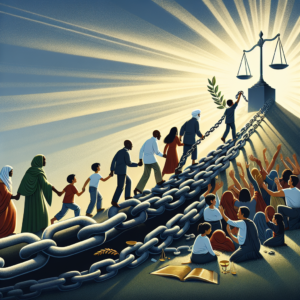The Redemption Road: Biblical Lessons from Pulp Fiction (1994)
Have you ever watched a film and suddenly found yourself reflecting on deeper spiritual truths? While Quentin Tarantino’s cult classic, Pulp Fiction (1994), might not be the first movie that comes to mind for Bible study, its intricate characters and thought-provoking scenarios offer ripe parallels with biblical principles. This mash-up might seem unconventional, but bear with me as we delve into a world where Samuel L. Jackson’s Jules Winnfield and divine redemption go hand in hand.
A Prominent Path of Redemption
Let’s start with one of the most profound moments in Pulp Fiction—Jules Winnfield’s (Samuel L. Jackson) transformation. Jules, a hardened hitman, experiences a sudden and unexpected epiphany after surviving a miraculous gunfight. This pivotal moment echoes the transformative power of repentance and redemption we read about in the Bible.
In the movie, Jules quotes Ezekiel 25:17, although he adds his own twists to it. But the essence of his final monologue centers on mercy and righteousness. Consider the scriptural narrative of Saul’s conversion to Paul in Acts 9:1-19. Just like Jules, Saul undergoes a radical transformation that reshapes his purpose and life direction. These powerful examples remind us that no one is beyond God’s reach or beyond the possibility of change and redemption.
Reflect: Have you experienced a turning point in your life akin to Jules’ or Saul’s? How did that moment shape your path towards redemption?
The Web of Consequences
Vincent Vega’s (John Travolta) story arc serves as a cautionary tale about choices and their inevitable consequences. His journey is marked by a series of poor decisions, culminating in his demise. This mirrors the wisdom found in Galatians 6:7-8: "Do not be deceived: God cannot be mocked. A man reaps what he sows. Whoever sows to please their flesh, from the flesh will reap destruction; whoever sows to please the Spirit, from the Spirit will reap eternal life."
Vincent’s life is a testament to the truth that our actions have far-reaching implications. The Bible repeatedly underscores the principle of sowing and reaping, urging us to make choices that align with righteousness. Vincent’s downfall reminds us to remain vigilant and seek wisdom in our decision-making processes.
Reflect: Are there areas in your life where you can better align your choices with biblical wisdom? What steps can you take to sow seeds of righteousness today?
Divine Intervention and Grace
Another memorable scene that lends itself well to spiritual reflection involves Butch Coolidge (Bruce Willis) and Marsellus Wallace (Ving Rhames) after their harrowing escape from the pawnshop basement. Butch and Marsellus form an unexpected alliance underscored by unspoken forgiveness.
This scenario can draw us towards the biblical concept of grace—unmerited favor that transforms lives. Consider the words of Ephesians 2:8-9: "For it is by grace you have been saved, through faith—and this is not from yourselves, it is the gift of God—not by works, so that no one can boast." This grace is available to all, and watching Butch extend a semblance of it to Marsellus paints a vivid picture of the power of forgiveness.
Reflect: Can you recall a time when you received or extended grace in an unexpected situation? How did it affect your relationship with the other person?
Servanthood and Humility
The character of The Wolf (Harvey Keitel), although brief in his appearance, embodies the principles of servanthood and humility. Despite his high-status and expertise, he approaches the scene with a professional and humble demeanor. Jesus exemplifies servanthood in John 13:1-17, when He washes His disciples’ feet—a task reserved for the lowest servants.
The Wolf’s readiness to serve underlines the call for Christians to embrace humility and serve others, echoing Jesus’ teachings in Matthew 20:26-28: "Not so with you. Instead, whoever wants to become great among you must be your servant, and whoever wants to be first must be your slave—just as the Son of Man did not come to be served, but to serve, and to give his life as a ransom for many."
Reflect: In what ways can you adopt a servant’s heart in your daily life? How can you serve those around you more humbly and effectively?
Interactive Reflections
-
Transformation and Redemption: Share a personal story or thought on experiencing a life-altering, transformational moment.
-
Consequences of Choices: Reflect on a time when you faced the consequences of your actions, and how that relates to the principles discussed.
-
Grace in Relationships: Discuss a moment when you offered or received grace and the impact it had on your relationship.
-
Servanthood Practice: Identify practical steps you can take to serve others within your community. Share ideas in the comments to inspire others!
Final Call to Action
Pulp Fiction (1994), with its non-linear narrative and gritty characters, may seem like an unexpected source for biblical reflections, yet it presents rich opportunities for spiritual insights. By examining the themes of redemption, consequences, grace, and servanthood through the lens of scripture, we uncover valuable lessons for our own lives.
As you reflect on these themes, I invite you to share your thoughts and experiences in the comments below. Engage in a meaningful conversation about transformation, choices, grace, and servanthood. Let’s inspire and uplift each other as we navigate our unique journeys of faith.
Don’t forget to subscribe to our newsletter for more devotional content and insightful reflections. Together, let’s continue to grow and learn from both ancient texts and modern narratives.
If you want to see how ANY movie relates to Biblical principles, please try our Movies and Scripture GPT. Simply key in any movie and let it show you insights you might not have realized otherwise!


